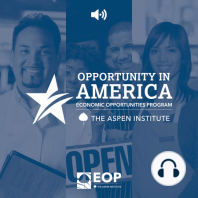77 min listen

The Occupational Safety and Health Act: The Past and Future of Workers’ Well-Being
FromOpportunity in America - Events by the Aspen Institute Economic Opportunities Program
The Occupational Safety and Health Act: The Past and Future of Workers’ Well-Being
FromOpportunity in America - Events by the Aspen Institute Economic Opportunities Program
ratings:
Length:
75 minutes
Released:
May 4, 2022
Format:
Podcast episode
Description
President Nixon signed the Occupational Safety and Health Act (OSH) in 1970 following decades of workplace injuries and fatalities at mines, factories, construction sites, and other industrial settings. OSH is meant to ensure safe and healthful working conditions for workers by setting and enforcing standards and by providing training, outreach, education, and assistance. The law has been a tremendous success in protecting workers and has had a considerable impact on workplace safety. Workplace fatalities have dropped by 65% since 1970, and workplace injuries and illnesses have dropped by 67% in about the same amount of time.
Even with this remarkable progress, challenges remain in protecting workers in traditionally dangerous work, including construction and agriculture, as well as industries such as retail and health care. The COVID-19 pandemic not only underscored the need for worker protections across sectors, but also demonstrated the need for the government to play a role in setting standards, monitoring workplaces, enforcing regulations, and educating and training employers and employees on risks and risk prevention. The rise in temporary work, the gig economy, and the use and misclassification of independent contractors who are excluded from OSH has created additional challenges in protecting workers. And as the pandemic illuminated, access to safe workplaces is not shared equitably. Black and Latino workers suffer disproportionately from dangers in the workplace and are more likely to die on the job. How do we address these inequities and build a safer workplace for all workers? What can we learn from the history and implementation of OSH?
This event features a panel discussion with Magaly Licolli (Venceremos), Dr. David Michaels (The George Washington University School of Public Health), Saket Soni (Resilience Force), Jon Woodsum (Barton Malow Company), and moderator Andrea Hsu (NPR). This is the fourth discussion in a five-part series, The History and Future of U.S. Labor Law: Conversations to Shape the Future of Work.
Even with this remarkable progress, challenges remain in protecting workers in traditionally dangerous work, including construction and agriculture, as well as industries such as retail and health care. The COVID-19 pandemic not only underscored the need for worker protections across sectors, but also demonstrated the need for the government to play a role in setting standards, monitoring workplaces, enforcing regulations, and educating and training employers and employees on risks and risk prevention. The rise in temporary work, the gig economy, and the use and misclassification of independent contractors who are excluded from OSH has created additional challenges in protecting workers. And as the pandemic illuminated, access to safe workplaces is not shared equitably. Black and Latino workers suffer disproportionately from dangers in the workplace and are more likely to die on the job. How do we address these inequities and build a safer workplace for all workers? What can we learn from the history and implementation of OSH?
This event features a panel discussion with Magaly Licolli (Venceremos), Dr. David Michaels (The George Washington University School of Public Health), Saket Soni (Resilience Force), Jon Woodsum (Barton Malow Company), and moderator Andrea Hsu (NPR). This is the fourth discussion in a five-part series, The History and Future of U.S. Labor Law: Conversations to Shape the Future of Work.
Released:
May 4, 2022
Format:
Podcast episode
Titles in the series (100)
From Fast Food to Fine Cuisine: A Discussion on Work in the Restaurant Industry by Opportunity in America - Events by the Aspen Institute Economic Opportunities Program